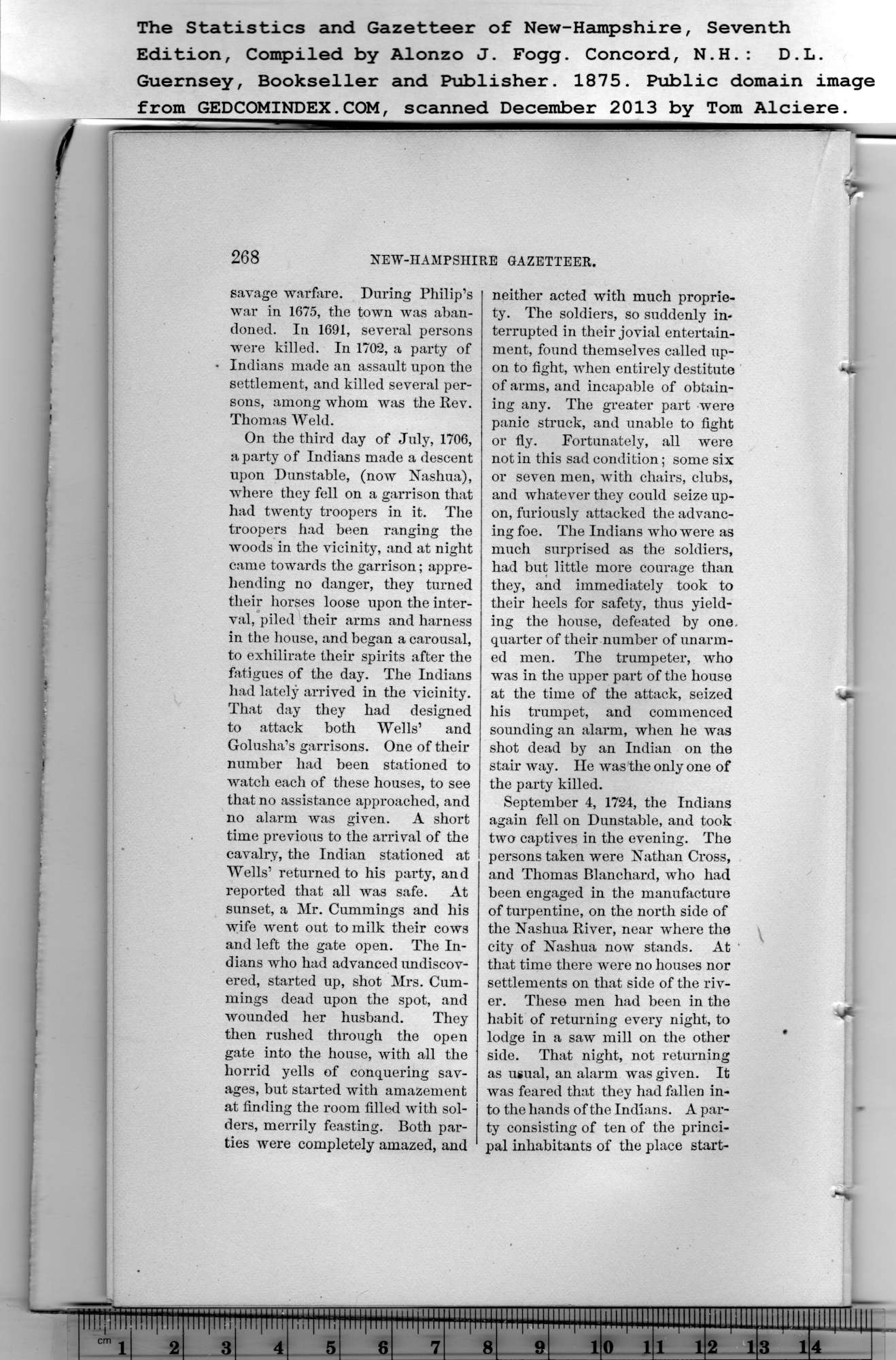|
savage warfare. During Philip’s
war in 1675, the town was aban-
doned. In 1691, several persons
were killed. In 1702, a party of
Indians made an assault upon the
settlement, and killed several per-
sons, among whom was the Rev.
Thomas Weld.
The Statistics and Gazetteer of New-Hampshire, Seventh
Edition, Compiled by Alonzo J. Fogg. Concord, N.H.: D.L.
268 NEW-HAMPSHIRE GAZETTEER.
On the third day of July, 1706,
a party of Indians made a descent
upon Dunstable, (now Nashua),
where they fell on a garrison that
had twenty troopers in it. The
troopers had been ranging the
woods in the vicinity, and at night
came towards the garrison; appre-
hending no danger, they turned
their horses loose upon the inter-
val, piled their arms and harness
in the house, and began a carousal,
to exhilirate their spirits after the
fatigues of the day. The Indians
had lately arrived in the vicinity.
That day they had designed
to attack both Wells’ and
Golusha’s garrisons. One of their
number had been stationed to
watch each of these houses, to see
that no assistance approached, and
no alarm was given. A short
time previous to the arrival of the
cavalry, the Indian stationed at
Wells’ returned to his party, and
reported that all was safe. At
sunset, a Mr. Cummings and his
wife went out to milk their cows
and left the gate open. The In-
dians who had advanced undiscov-
ered, started up, shot Mrs. Cum-
mings dead upon the spot, and
wounded her husband. They
then rushed through the open
gate into the house, with all the
horrid yells of conquering sav-
ages, but started with amazement
at finding the room filled with sol-
ders, merrily feasting. Both par-
ties were completely amazed, and
neither acted with much proprie-
ty. The soldiers, so suddenly in-
terrupted in their jovial entertain-
ment, found themselves called up-
on to fight, when entirely destitute
of arms, and incapable of obtain-
ing any. The greater part were
panic struck, and unable to fight
or fly. Fortunately, all were
not in this sad condition; some six
or seven men, with chairs, clubs,
and whatever they could seize up-
on, furiously attacked the advanc-
ing foe. The Indians who were as
much surprised as the soldiers,
had but little more courage than
they, and immediately took to
their heels for safety, thus yield-
ing the house, defeated by one.
quarter of their number of unarm-
ed men. The trumpeter, who
was in the upper part of the house
at the time of the attack, seized
his trumpet, and commenced
sounding an alarm, when he was
shot dead by an Indian on the
stair way. He was the only one of
the party killed. |
September 4, 1724, the Indians
again fell on Dunstable, and took
two captives in the evening. The
persons taken were Nathan Cross,
and Thomas Blanchard, who had
been engaged in the manufacture
of turpentine, on the north side of
the Nashua River, near where the
city of Nashua now stands. At
that time there were no houses nor
settlements on that side of the riv-
er. These men had been in the
habit of returning every night, to
lodge in a saw mill on the other
side. That night, not returning
as usual, an alarm was given. It
was feared that they had fallen in-
to the hands of the Indians. A par-
ty consisting of ten of the princi-
pal inhabitants of the place start- |
